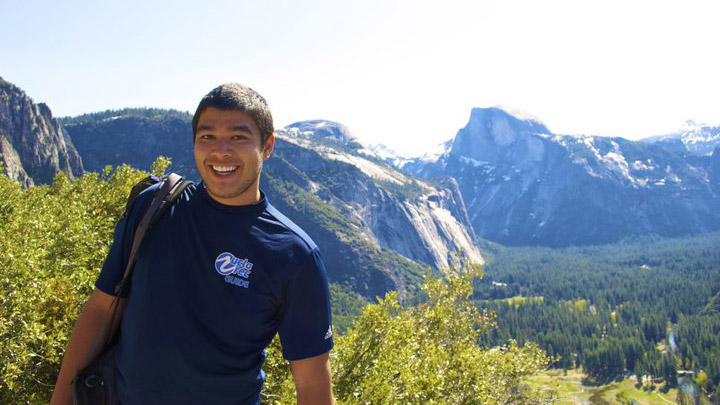
Blog |
The Eco-Educator: Dennis Mabasa, Environmental Science, 2012
If the next generation never sees the environment, never experiences it first-hand, how can we ever expect them to want to save it?
IoES Environmental Science alumnus Dennis Mabasa has thrown himself into making sure young people — and the rest of us — don’t face that dilemma.
As an education manager at the Trinity River Audubon Center in South Dallas Texas, Mabasa is charged with making sure kids living in the cities and suburbs of the Dallas-Fort Worth metroplex are exposed to and learn to appreciate the natural world.
Working with middle school and high school populations, Mabasa takes students used to canvassing the concrete on hiking trails, along prairies and wetlands, and canoeing and kayaking in the river.
“The goal is really to create a positive memory outside,” says Mabasa. “We do a lot more than just camp — we’re providing experiences to kids here in Dallas that have never seen a forest or mountain or really been out in nature at all.”
“It’s So Important for Kids to Have These Experiences”
One of the 50 state centers of the Audubon Society, the Trinity River facility is designed to further Audubon’s mission to conserve and restore natural ecosystems by connecting people with nature through science, education and policy efforts.
“The program made me realize that conservation issues can be looked at from more than one angle and that really altered my thought process and how I approach any issue — to think of it from the perspective of a politician, a scientist, and a teacher. That’s what I really got out of the IoES: to see one issue from multiple angles, which I think is unique in the university system.”
It was just a day after emailing his resume that Audubon contacted Mabasa about his current position based on his background in environmental science and travel experience. As director of Audubon’s Conservation Treks he plans, markets, and leads all aspects of travel camps — including overnight and multi-week outdoor expeditions to different state and national parks in Texas for Dallas-based students in grades 6-12.
Some trips are subsidized, with kids coming on treks and expeditions that couldn’t afford the programs on their own. Many participants come from single parent households and have to work multiple jobs to contribute to the family income.
Mabasa says the trips have a perceptible effect on the students: helping them grow, improving their leadership and communications skills, and building their confidence.
His other responsibilities are to Trinity River Center programs: teaching on-site field trips and off-site education programs and community engagement. “As an education manager I wear many hats,” he says.
“Seeing the students get inspired, seeing them love being outdoors, that’s what makes me really happy and proud to work in this field,” he says. “It’s so important for kids to have these experiences.”
How an IoES Degree Set Him Up for Success
Mabasa says he appreciated the interdisciplinary design of the Environmental Science undergraduate degree and diversity of classes in subjects like public health, water management and environmental engineering.
“The program made me realize that conservation issues can be looked at from more than one angle and that really altered my thought process and how I approach any issue — to think of it from the perspective of a politician, a scientist, and a teacher. That’s what I really got out of the IoES: to see one issue from multiple angles, which I think is unique in the university system.”
He continues: “Coming out of the IoES, it’s an elite institution, it’s an elite program, and the skills that I picked up, I didn’t realize at the time how important they were, how important they would come into play and be later on.”
In his senior year of the program, in the Practicum in Environmental Science, Mabasa worked on a case study for the National Park Service, analyzing post-fire rehabilitation in chaparral grasslands communities of the Santa Monica Mountains. He says he found the combination of seeing a research project from start to finish, creating a relevant and useful final product, and working in a team with individuals of different backgrounds very significant.
“It was very empowering to see that something you create can have an impact,” he states.
Having been given the chance to hone his own skills through IoES’s academic program, Mabasa loves being able to organize environmental stewardship programs for those that would otherwise not have access to these kinds of opportunities.
Of the students he’s taught at the Trinity River Audubon Center, five have gone on to college and enrolled in environmental science programs. One of his former students in her first year of college already plans to become an environmental lawyer.
“If I can make half of them declare environmental science I’ve done my job,” he says.
